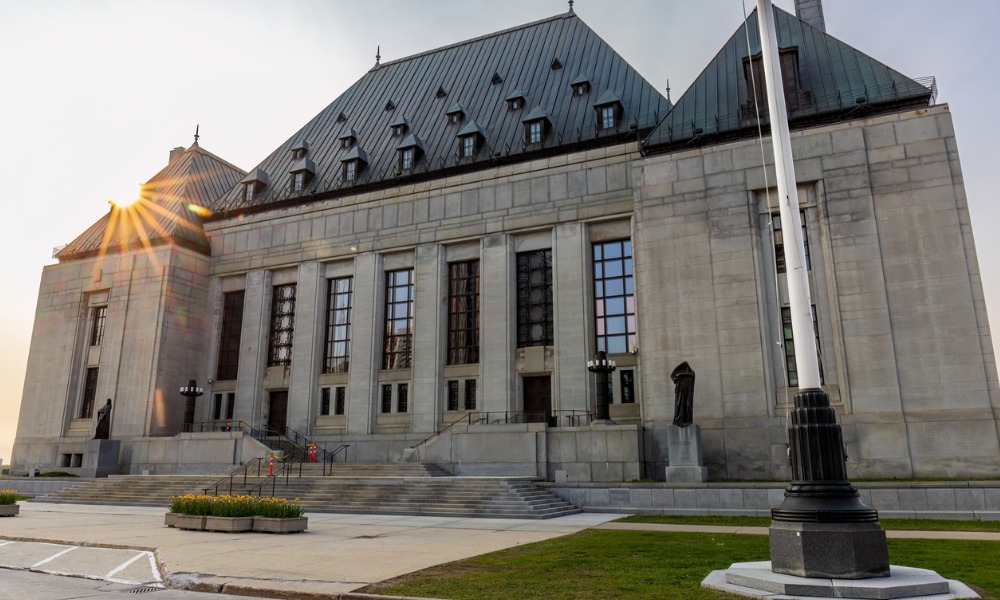
Man's acquittal restored

The Supreme Court of Canada has restored the acquittals on second-degree murder and manslaughter charges of a man who accidentally killed another with a chokehold.
R. v. Hodgson, 2024 SCC 25, which originated in Nunavut, dealt with the law of self-defence, the scope of the Crown’s right to appeal an acquittal, and the mens rea (the accused’s state of mind) required for a second-degree murder conviction.
The SCC allowed the appeal from the bench on Feb. 15 and released its reasons Friday morning.
The SCC “emphasized the very narrow scope of appellate review” available to the Crown on an acquittal and “the very high bar” for finding subjective intent for murder, says Stacey Purser, who acted for the Criminal Trial Lawyers' Association (CTLA), an intervenor.
The incident leading to the victim’s death occurred at a house party. The appellant, Daniel Hodgson, was asked to help remove a belligerent guest. This escalated into a fight, and when Hodgson restrained the other man with a chokehold, it caused him to lose consciousness and die.
The trial judge acquitted Hodgson of second-degree murder and the lesser offence of manslaughter. On the murder charge, the judge found that the Crown failed to establish that he had the requisite subjective mens rea. For manslaughter, the judge found that Hodgson’s self-defence argument had an “air of reality” because the Crown failed to demonstrate that the chokehold was unreasonable, considering the circumstances. But the Court of Appeal ordered a new trial, finding the trial judge erred in law on the mens rea and the self-defence analyses.
Justices Sheilah Martin and Mary Moreau, who wrote the reasons for the court, said the Crown’s right to appeal an acquittal is limited to questions of law alone. They said the restricted nature of this ability to appeal has “deep roots in the principles that underlie the Canadian justice system.” Most importantly, the principle against double jeopardy.
The scope of the Crown’s right to appeal an acquittal extends to legal questions but not to questions about how to weigh evidence and assess whether the evidence meets the standard of proof. If a trial judge made a finding of fact without evidentiary backing, assessed evidence based on an incorrect legal principle, failed to consider all the evidence in finding guilt or innocence, or there is dispute over the legal effect of a finding of fact, the judge’s mistake may constitute an error of law.
Martin and Moreau noted that once a legal error is demonstrated, the Crown must persuade the appellate court that acquittal would not necessarily have been the verdict had the error not occurred.
In Hodgson’s case, the Court of Appeal failed to adequately explain how the trial judge’s error on the question of mens rea was solely a legal error. According to the SCC, there was no legal error.
The trial judge and appeal court had disagreed on the inherent dangerousness of a chokehold. The latter was of the view that Hodgson would have known that in applying one to the victim carried the likelihood of killing him.
The CTLA focused its intervention on the Nunavut Court of Appeal’s interpretation of R. v. Lemmon, 2012 ABCA 103, which it had found stood for the notion that a chokehold is always an inherently dangerous act. The appeal court said that the trial judge failed to address this issue when assessing the intent for murder or manslaughter.
“They took this extremely broad reading of Lemmon and applied it to the mens rea for murder. So, the Supreme Court really shut that down,” says Purser.
Martin and Moreau said that this perspective “runs the risk of inappropriately injecting an objective element into the mens rea analysis.” The mens rea required for a murder conviction is focused on the accused’s intention, not what they ought to have known about a chokehold’s risk. To meet the required level of subjective intent, the accused must have intended to cause death or must have intended to cause bodily harm, knew they would likely cause death, but were reckless about whether their actions would result in the victim’s death.
The trial judge accepted that Hodgson did not think a chokehold was inherently dangerous and lacked the time, amid the altercation, to consider its dangerousness. Martin and Moreau said the Court of Appeal’s disagreement with the trial judge’s characterization of a chokehold in these particular circumstances was not an error of law that justified overturning the acquittal.
The self-defence question, on the other hand, is an objective analysis. The SCC found that there were no grounds to conclude that the trial judge erred in law on the application of the law concerning self-defence. The trial judge was clear she had assessed whether Hodgson’s actions were reasonable in the circumstances on an objective standard. And the Court of Appeal failed to clearly identify which element of the self-defence inquiry it disputed, said Martin and Moreau.